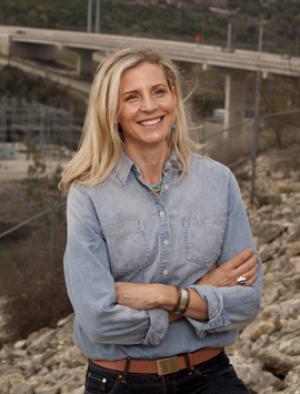EIHS Lecture: The Appropriation of Indigenous Knowledge from the "Discovery" of Rainbow Bridge to the Glen Canyon Dam Debates
Erika M. Bsumek, University of Texas at Austin
The stakes surrounding the construction of regional dams, like Glen Canyon Dam, were especially high for Native Americans. Such projects were built not only on Indigenous land, but also depended on the appropriation of Indigenous knowledge. This talk traces how settlers, scientists, explorers, and engineers sought to possess Indigenous knowledge and ended up creating an infrastructure of dispossession in the process. Indigenous people, in turn, engineered a variety of responses to retain possession of their land, control religious activities, foster greater cross-cultural understanding, and manage their natural resources.
Professor Bsumek is currently associate professor of history at the University of Texas at Austin. She earned a BA at the University of Utah and PhD from Rutgers University. She has written on Native American history, environmental history, the history of the built environment, and the history of the US West. She is author of Indian-made: Navajo Culture in the Marketplace, 1848-1860 (University Press of Kansas, 2008) and the co-editor a collection of essays on global environmental history titled Nation States and the Global Environment: New Approaches to International Environmental History (Oxford University Press, 2013). Her current research explores the social and environmental history of the area surrounding Glen Canyon Dam on the Utah-Arizona border from the 1840s to the present. The working title of the book, currently under contract, is "Damming Zion: Mormons, American Indians, and the Fight for Resources on the Colorado Plateau, 1800 to the Present." She is also working on a larger project that examines the impact that large construction projects (dams, highways, cities and suburbs) had on the American West which is tentatively titled "The Concrete West: Engineering Society and Culture in the Arid West, 1900-1970." She has written op-eds for publications such as Time, Huffington Post, Al Jazeera America, and Pacific Standard and is currently a Provost's Teaching Fellow.
Free and open to the public.
This event is part of the Thursday Series of the Eisenberg Institute for Historical Studies. It is made possible by a generous contribution from Kenneth and Frances Aftel Eisenberg.
Professor Bsumek is currently associate professor of history at the University of Texas at Austin. She earned a BA at the University of Utah and PhD from Rutgers University. She has written on Native American history, environmental history, the history of the built environment, and the history of the US West. She is author of Indian-made: Navajo Culture in the Marketplace, 1848-1860 (University Press of Kansas, 2008) and the co-editor a collection of essays on global environmental history titled Nation States and the Global Environment: New Approaches to International Environmental History (Oxford University Press, 2013). Her current research explores the social and environmental history of the area surrounding Glen Canyon Dam on the Utah-Arizona border from the 1840s to the present. The working title of the book, currently under contract, is "Damming Zion: Mormons, American Indians, and the Fight for Resources on the Colorado Plateau, 1800 to the Present." She is also working on a larger project that examines the impact that large construction projects (dams, highways, cities and suburbs) had on the American West which is tentatively titled "The Concrete West: Engineering Society and Culture in the Arid West, 1900-1970." She has written op-eds for publications such as Time, Huffington Post, Al Jazeera America, and Pacific Standard and is currently a Provost's Teaching Fellow.
Free and open to the public.
This event is part of the Thursday Series of the Eisenberg Institute for Historical Studies. It is made possible by a generous contribution from Kenneth and Frances Aftel Eisenberg.
| Building: | Tisch Hall |
|---|---|
| Event Type: | Lecture / Discussion |
| Tags: | Environment, History, Lecture, Native American |
| Source: | Happening @ Michigan from Eisenberg Institute for Historical Studies, Department of History |
The Thursday Series is the core of the institute's scholarly program, hosting distinguished guests who examine methodological, analytical, and theoretical issues in the field of history.
The Friday Series consists mostly of panel-style workshops highlighting U-M graduate students. On occasion, events may include lectures, seminars, or other programs presented by visiting scholars.
The insitute also hosts other historical programming, including lectures, film screenings, author appearances, and similar events aimed at a broader public audience.


